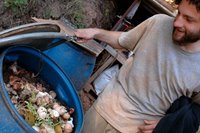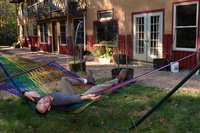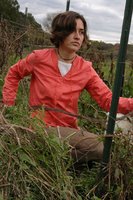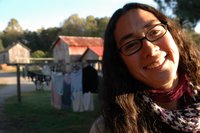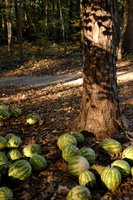this season's people
"I used to say that if you took all religions like on IBM punch cards...some of the holes would go clear through the stack...and that's what we're interested in. We agreed that if you actually felt like we were all one, it seemed like you would live somehow collectively so that everybody could have some of what was happening..."
 This was Stephen Gaskin's response to Erin's question, "What were the founding principles of The Farm?" It was late afternoon a week ago and we were sitting in Stephen Gaskin's bedroom; he was lounging with his cat on the bed and we were sitting nearby trying to absorb every word of this legendary figure in the hippie subculture movement. Gaskin describes himself as a "non-superstitious psychedelic freethinker" and at 70 years old, he is still an articulate visionary, inciting people to wake up and speak out. In 1980, he was the first recipient of the Right Livelihood Award, the alternative to the Nobel Prize, which has since been awarded to leaders such as Vandana Shiva, Helen Mack and Mordechai Vanunu. He received the award for founding The Farm, an intentional community in Tennessee, an hour south of Nashville and the 4th stop on our community tour.
This was Stephen Gaskin's response to Erin's question, "What were the founding principles of The Farm?" It was late afternoon a week ago and we were sitting in Stephen Gaskin's bedroom; he was lounging with his cat on the bed and we were sitting nearby trying to absorb every word of this legendary figure in the hippie subculture movement. Gaskin describes himself as a "non-superstitious psychedelic freethinker" and at 70 years old, he is still an articulate visionary, inciting people to wake up and speak out. In 1980, he was the first recipient of the Right Livelihood Award, the alternative to the Nobel Prize, which has since been awarded to leaders such as Vandana Shiva, Helen Mack and Mordechai Vanunu. He received the award for founding The Farm, an intentional community in Tennessee, an hour south of Nashville and the 4th stop on our community tour.So what did religion and IBM punch cards have to do with the genesis of this 1700-acre, 175-member community deep in the Bible Belt?
In 1967, as the United States got more embroiled in the Vietnam War, Gaskin started teaching what came to be known as the Monday Night Class at San Francisco State College. Of the class, Gaskin remarked to us, "doing Monday Night Class was a tremendous privilege because everybody was tracking so well together on ideas and other things, you could see an idea go across like wind on a wheatfield." As Farm Historian Albert Bates describes, "Stephen would say, 'Let's talk about how we're gonna be.' Not 'how we're gonna stop the war' or 'how we're gonna make it fair,' but 'how we're gonna be.'" The energy and ability for people to generate ideas and understand these concepts was often a result of experimentation with LSD. At the time, "tripping" seemed like the most effective way to access a higher spiritual plane and understand that "we are all one".
As the class grew to six hundred people, there was a feeling among participants that some kind of planetary change was afoot. Like any movement, you could take a few different approaches to this impending change. Sectors of society like the Weathermen adopted a revolutionary , violent anti-government approach; others participated on a political level. Those who were part of Gaskin's Monday Night class took a spiritual approach.
In 1971, the class morphed into a caravan of 70 buses and 250 people that travelled around the United States with Gaskin giving lectures at universities and churches and others speaking out about the war. The caravan eventually made it to Tennessee where they bought their first 1,000 acres of land for $70/acre. Then, as Gaskin describes, "our kids got to see us be doers".
 Working together and pooling their resources, they began clearing and cultivating the land, building houses, installing a water system, constructing their own roads and establishing their own midwifery clinic. The Farm's numbers continued to grow throughout the seventies with 50-70 people living in one house at a time. In the early eighties, the community reached 1500 people. The sheer size of this "experiment" created a statistic that was noticed around the country.
Working together and pooling their resources, they began clearing and cultivating the land, building houses, installing a water system, constructing their own roads and establishing their own midwifery clinic. The Farm's numbers continued to grow throughout the seventies with 50-70 people living in one house at a time. In the early eighties, the community reached 1500 people. The sheer size of this "experiment" created a statistic that was noticed around the country.In The Farm's brochure, under their guiding principles, it states "we believe that we, individually and collectively, create our own life experience." Peter Schweitzer, an original farmie (as they call themselves) and Executive Director of Plenty International, the Farm's international aid and development NGO, explained it to us another way, "We are the writers and directors of our movie. We are not the victims of whatever the government wants to do. No, we are the authors...and that's liberating."
 To grow food, erect buildings, get married, deliver the babies and ultimately create a community, no one from The Farm ever asked for any permission. No church, corporation or state was consulted; those that founded the community believed in a vision and authored their own way of living. They did not wait around to see whether or not they were "allowed" to create another reality; they went ahead and made their own revolutionary movie.
To grow food, erect buildings, get married, deliver the babies and ultimately create a community, no one from The Farm ever asked for any permission. No church, corporation or state was consulted; those that founded the community believed in a vision and authored their own way of living. They did not wait around to see whether or not they were "allowed" to create another reality; they went ahead and made their own revolutionary movie.In reference to the current world situation, one community member shared that, for him, President Bush represents the worst of us - our worst fears and our violent, reactive side. As Gaskin reminded us in quoting the Second Coming, "The best lack all convictions, while the worst are full of passionate intensity." We need to counterbalance this anti-life atmosphere with a way of living that is compassionate and nonviolent. More than that, however, we need to stop waiting for things to happen to us and instead, change the course of what is happening.
I'm humbled and fascinated by what was created on The Farm...and in those moments of reflection, when my dreams override my fears of what I can or can not do, I'm incredibly excited about the next movie that I, we, all of us who believe in human rights, nonviolence and respect for the earth will come to create.
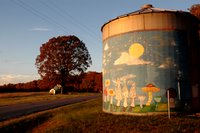 You are the people.
You are the people.You are this season's people -
There are no other people this season.
If you blow it, it's blown.
- Stephen Gaskin in ...this season's people
Kareen





